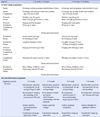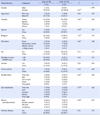Abstract
Purpose
The purpose of this study was to verify the effects of the integrated dementia managing programme for the elderly with mild dementia in which the physiological, cognitive, emotional, sociological and spiritual aspects have considered.
Methods
This study employed non-equivalent control group pre-post tests with the repeated measure design. The subjects of the study were 39 elderly with mild dementia (20 in the experimental group and 19 in the control group) who have admitted to two nursing homes in B city. The data were analyzed by repeated measures ANOVA.
Results
There were significant interactions between two groups and times in self-efficacy (p=.011), cognitive function (p<.001), depression (p=.005), spiritual well-being (p=.002), and quality of life (p=.037). The integrated dementia managing programme of this study showed significant positive effects on the quality of life for the elderly with mild dementia.
Conclusion
On considering the current trends of aging and increasing number of the elderly with dementia, this integrated programme would be highly recommended to be used in nursing homes for the elderly with mild dementia, and contribute to improving their quality of life, and saving the social and medical expenses as well.
Figures and Tables
References
1. Statistics Korea. 2017 survey on the actual condition of the elderly in Korea [Internet]. Seoul: Statistics Korea;2017. cited 2018 June 18. Available from: http://kostat.go.kr/portal/korea/index.action.
2. Jung HY. 1 Million dementia patient in 2024 annual saving 5 billion by early treatment. Seoul News Paper. 2017. 10. 02. Sect.01.
3. Seoul National University Hospital. Medical information on longitude cognitive disorder [Internet]. Seoul: Seoul National University Hospital;2016. cited 2018 June 18. Available from: http://terms.naver.com/entry.nhn?docId=926670&mobile&cid.
4. Dickson K, Lafortune L, Kavanngh J, Thomas J, Mays N, Erens B. Non-drug treatments for symptom in dementia: An overview of systematic review of non-pharmacological intervention in the management of neuropsychiatric symptoms and challenging behaviors in patients with dementia[Internet]. Policy London: RIRU publication. 2012. cited 2018 June 18. Available from: https://eppi.ioe.ac.uk/cms/Portals/0/PDF%20reviews%20and%20summaries/Dickson_R2012_Dementia%20treatments.pdf?ver=2013-03-20-163715-197.
5. Jeon MS. The effect of cognitive functions enhancement program on the improvement of life's quality and stress for elderly with dementia. Korean Society of Gerontological Social Welfare. 2016; 6(1):505–523.
6. Ji HR, Choi SH, Cho MS, Ju RE. The effects of the continuous dementia nursing intervention program on cognitive function and depression of the elderly with mild dementia in the community. Journal of Korean Gerontological Nursing. 2004; 6(2):216–227.
7. Lee YM, Park NH. The effects of dementia prevention program on cognition, depression, self-esteem and quality of life in the elderly with mild cognitive disorder. Korean Journal of Adult Nursing. 2007; 19(5):787–796.
8. Kim SH, Bae SY, Ryu KS. A research on the integrative arts therapy for the elderly with dementia. Media & Perform Ain Arts. 2017; 12(3):9–26. DOI: 10.22534/broad.2017.12.3.9.

9. Lee HJ, Hwang KY. The effects of cognitive rehabilitation program on EEG for patients with vascular dementia. Journal of Special Education & Rehabilitation Science. 2014; 53(2):213–230.

10. Park JW. Development and effects of christian cognition program for the elderly with mild cognitive impairment in the elderly school of church [dissertation]. Busan: Kosin University;2017. 147.
11. Faul F, Erdfelder E, Lang AG, Buchner A. Statistical power analyses using G*Power 3.1: Tests for correlation and regression analyses. Behavior Research Methods. 2009; 41(4):1149–1160. DOI: 10.3758/BRM.41.4.1149.

12. Gu MO, Eun Y, Kim ES, An HR, Kwon IS, Oh HS, et al. Effects of an elder health promotion program using the strategy of elder health leader training in senior citizen halls. Journal of Korean Academy of Nursing. 2012; 42(1):125–135. DOI: 10.4040/jkan.2012.42.1.125.

13. Hwang ID, Park JS. Effects of the bibliotherapy on depression and social behavior and remark of dotard dementias old adults. Journal of Korean Library and Information Science Society. 2010; 41(4):383–402.
14. Ji E, Kim O. Effect of the laughter therapy combined with cognitive reinforcement program for the elderly with mild cognitive impairment. Korean Journal of Adult Nursing. 2014; 26(1):34–45. DOI: 10.7475/kjan.2014.26.1.34.

15. Roh KH. Effect of aroma leg massage on the depression and hope, stride length in the elderly. Journal of Korean Gerontological Nursing. 2004; 6(2):163–169.
16. Sherer M, Maddux JE, Mercandante B, Prentice-Dunn S, Jacobs B, Rogers RW. The self-efficacy scale: Construction and validation. Psychological Reports. 1982; 51(2):663–671. DOI: 10.2466/pr0.1982.51.2.663.

17. Oh HS. Health promoting behaviors and quality of life of Korean women with arthritis. Journal of Korean Academy of Nursing. 1993; 23(4):617–630. DOI: 10.4040/jnas.1993.23.4.617.

18. Folstein MF, Folstein SE, McHugh PR. “Mini-mental state”: A practical method for grading the cognitive state of patients for the clinician. Journal of Psychiatric Research. 1975; 12(3):189–198. DOI: 10.1016/0022-3956(75)90026-6.
19. Kwon YC, Park JH. Development of the test for the elderly Korean version of Mini-Mental State Examination (MMSE-K). Journal of the Korean Neuropsychiatric Association. 1989; 28(1):125–135.
20. Yesavage JA, Sheikh JI. Geriatric depression scale (GDS) recent evidence and development of a shorter violence. Clinical Gerontologist. 1986; 5(1-2):165–173. DOI: 10.1300/J018v05n01_09.
21. Kee BS, Lee CW. A preliminary study for the standardization of geriatric depression scale in Korea. Journal of the Korean Neuropsychiatric Association. 1995; 34(6):1875–1885.
22. Kee BS. A preliminary study for the standardization of a Geriatric Depression Scale Short Form-Korean version (GDSSF-K). Journal of Korean Neuropsychiatry Association. 1996; 131(2):298–307.
23. Paloutzian RF, Ellison CW. Loneliness, spiritual well-being and the quality of life. In : Peplau LA, Perlman D, editors. Loneliness: a sourcebook of current theory, research and therapy. New York: John Wiley & Sons;1982. p. 224–236.
24. Choi SS. Correlational study on spiritual wellness, hope and perceived health status of urban adults [dissertation]. Seoul: Yonsei University;1991. 335.
25. Kang JH. A study on the spiritual status of cancer patients [master's thesis]. Busan: Pusan National University;1996. 67.
26. World Health Organization. WHOQOL Measuring quality of life. Geneva: World Health Organization;1997. cited 2018 June 18. Available from: https://www.who.int/mental_health/media/68.pdf.
27. Min SK, Lee CI, Kim KI, Suh SY, Kim DK. Development of Korean version of WHO quality of life scale abbreviated version (WHOQOL-BREF). Journal of Korean Neuropsychiatry Association. 2000; 39(3):571–579.
28. Aimee S, Lene T, Bob W, Lindsay R, Steve D, Margaret B, et al. Efficacy of an evidence-based cognitive stimulation therapy programme for people with dementia: Randomised controlled trial. The British Journal of Psychiatry. 2003; 183(3):248–254. DOI: 10.1192/bjp.183.3.248.
29. Yoon HS, Lee EK, Lee JE, Yoon JY, Kim ES, Jang EJ, et al. Effectiveness of integrated health program for the elderly-bodymind-spirit program. Korean Journal of Gerontological Social Welfare. 2010; 48(1):345–373.
30. Isaia D, Parker V, Murrow E. Spiritual well-being: Among older adults. Journal of Gerontological Nursing. 1999; 25(8):15–21. DOI: 10.3928/0098-9134-19990801-05.





 PDF
PDF ePub
ePub Citation
Citation Print
Print







 XML Download
XML Download